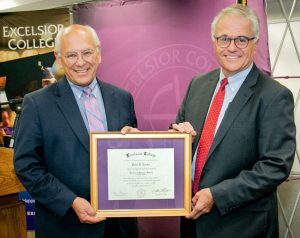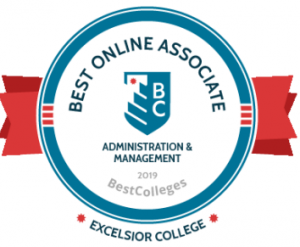Albany, NY – This month, Excelsior College launched a Writing in the Disciplines Certificate Course that is free and open to faculty interested improving their students’ writing skills. The professional development training includes a self-paced course with assessments and lightly moderated discussion forums during which faculty share resources and collaborate on designing assignments related to writing in the disciplines.
The course includes four modules:
- Introduction to Writing in the Disciplines
- Creating Effective Writing Assignments
- Peer Review and Revision
- Effective Feedback and Rubrics
Each module includes readings and videos and takes about three to five hours to complete. The entire course takes approximately 12 to 16 hours, depending on the level of discussion. The course is graded pass/fail, and participants need to earn 70 percent or better on all four quizzes, one per module, to earn the certificate.
Upon successful completion of this course, faculty receive a downloadable certificate in Writing in the Disciplines (WID). Writing in the Disciplines is a subfield of Writing Across the Curriculum (WAC), a nationwide movement designed to ensure students have frequent and significant opportunities to write, revise, and discuss their writing in their classes.
“We think this is an excellent professional development opportunity for faculty in any discipline,” says Ben Pearson, PhD, co-chair of Excelsior College’s Writing Across the Curriculum initiative. “Writing is a crucial 21st-century skill, and it’s not something students can master in just one to two required writing courses. The more opportunities that we can create for high-impact, high-quality writing assignments in our classes, the better prepared students will be for life and career success.”
The training is hosted on the popular MOOC platform within the Canvas Network, providing the same look and feel as Excelsior College courses. To view the course or for additional information, go to https://www.canvas.net/browse/excelsior/courses/writing-in-the-disciplines
This certificate training was developed by a team of about 10 faculty members with experience in teaching writing across a variety of disciplines and was supported by a grant from the Booth-Ferris Foundation. Many key elements of the training were developed as part of grant-funded collaboration among Excelsior College, SUNY Rockland, SUNY Clinton, SUNY Monroe, and other colleges.
# # #
Media Contact: Alicia Jacobs, ajacobs@excelsior.edu (518) 464-8531
ABOUT EXCELSIOR COLLEGE
Excelsior College (excelsior.edu) is a regionally accredited, nonprofit online college focused on helping adults complete their degrees and advance their careers. The college contributes to the development of a diverse, educated, and career-ready society by valuing lifelong learning with an emphasis on serving individuals historically underrepresented in higher education. Founded in 1971, Excelsior meets students where they are – academically and geographically – removing obstacles to the educational goals of adults pursuing continuing education and degree completion. Our pillars include innovation, flexibility, academic excellence, and integrity. Learn more at excelsior.edu.


